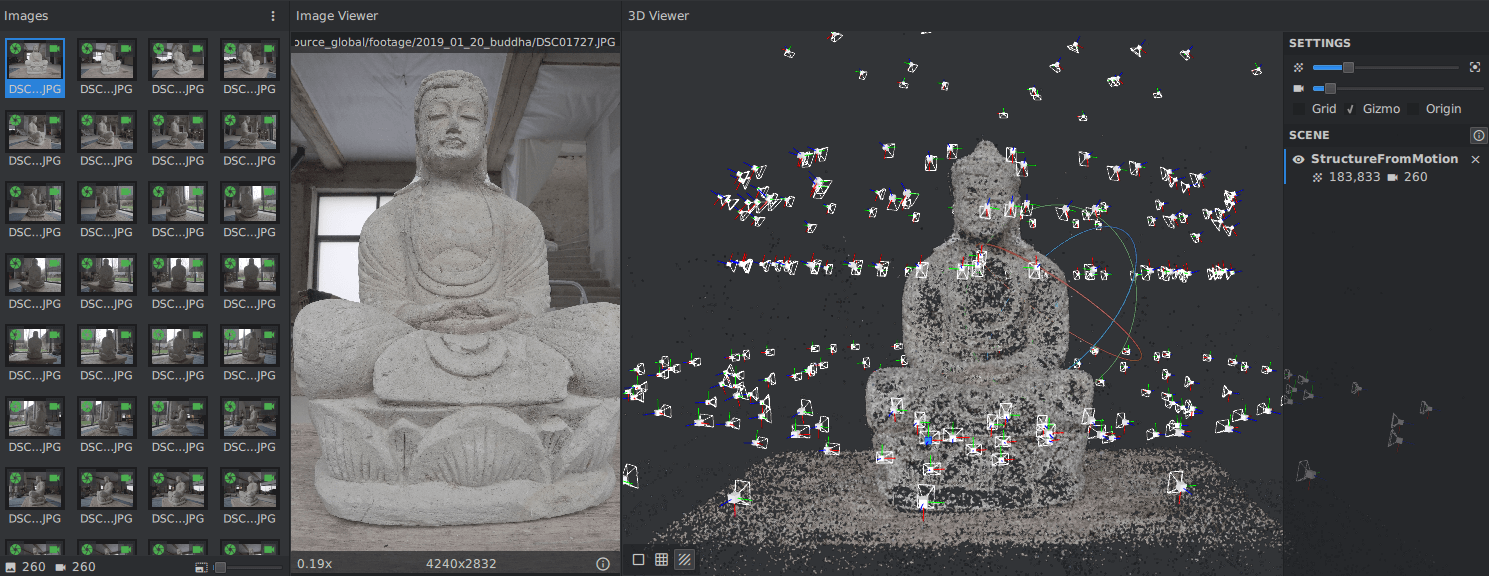Last Updated on December 20, 2022
Meshroom is 3D Reconstruction Software based on the AliceVision Photogrammetric Computer Vision framework.
Photogrammetry is the science of making measurements from photographs. It infers the geometry of a scene from a set of unordered photographs or videos. Photography is the projection of a 3D scene onto a 2D plane, losing depth information. The goal of photogrammetry is to reverse this process.
The project is a result of collaboration between academia and industry to provide cutting-edge algorithms with the robustness and the quality required for production usage.
This is free and open source software.
Features include:
- Photogrammetry workflow:
- High Quality 3D Models.
- Use GPUs to combine High Quality with Performance.
- Scalable solution (>1K Images).
- Nodal Editor with Caching Mechanism.
- Augment a solved Structure-From-Motion with new images.
- Post-processing and retexturing:
- Decimate your mesh.
- Retexture your mesh in Meshroom after retopology in Blender, ZBrush, Maya, …
- Use Custom UVs or automatically generate them.
- HDR Panorama workflow:
- Fusion of Multi-bracketing LDR images into HDR.
- Alignment of panorama images.
- Support for fisheye optics.
- Automatically estimate fisheye circle or manually edit it.
- Take advantage of motorized-head file.
- Render Farm submission:
- Easy to integrate in your Renderfarm System.
- Add specific rules to select the most suitable machines regarding CPU, RAM, GPU requirements of each Node.
- Custom Pipelines:
- Create custom pipelines and use it as a default template.
- Nodes are used to control the reconstruction:
- Attributes – they control what goes in the node and what comes out.
- Edges – file attributes can be connected.
- Hashes – every node has a hash based on its attributes.
- Files – every node has associated log(s), status(es) and statistics files. These allow the progress and performance of the process to be monitored.
- API
- Pipelines:
- Photogrammetry Pipeline – the default pipeline used to reconstruct a 3D model from 2D images.
- HDR Panorama Pipeline – fusion of multi-bracketing LDR images into HDR.
- Supported Formats:
- Image File formats – all formats supported by the OIIO library including jpg, tif, png, rw2, cr2, nef, and arw.
- Video File formats – including avi, mov, mkv, webm, mp4, mpg, and others.
- Panoramas
- 3D File formats – alembic, obj, ply, sfm. Alembic is the preferred choice for intermediate storage of points clouds, because it is the only format that is already supported by all of the major 3d software packages.
- Other file formats
- Submitters:
- API.
Website: alicevision.org
Support: Documentation, GitHub Code Repository
Developer: Meshroom Developers
License: Mozilla Public License Version 2.0

Meshroom is written in Python and QML. Learn Python with our recommended free books and free tutorials. Learn QML with our recommended free books and free tutorials.
| Popular series | |
|---|---|
| The largest compilation of the best free and open source software in the universe. Each article is supplied with a legendary ratings chart helping you to make informed decisions. | |
| Hundreds of in-depth reviews offering our unbiased and expert opinion on software. We offer helpful and impartial information. | |
| The Big List of Active Linux Distros is a large compilation of actively developed Linux distributions. | |
| Replace proprietary software with open source alternatives: Google, Microsoft, Apple, Adobe, IBM, Autodesk, Oracle, Atlassian, Corel, Cisco, Intuit, SAS, Progress, Salesforce, and Citrix | |
| Awesome Free Linux Games Tools showcases a series of tools that making gaming on Linux a more pleasurable experience. This is a new series. | |
| Machine Learning explores practical applications of machine learning and deep learning from a Linux perspective. We've written reviews of more than 40 self-hosted apps. All are free and open source. | |
| New to Linux? Read our Linux for Starters series. We start right at the basics and teach you everything you need to know to get started with Linux. | |
| Alternatives to popular CLI tools showcases essential tools that are modern replacements for core Linux utilities. | |
| Essential Linux system tools focuses on small, indispensable utilities, useful for system administrators as well as regular users. | |
| Linux utilities to maximise your productivity. Small, indispensable tools, useful for anyone running a Linux machine. | |
| Surveys popular streaming services from a Linux perspective: Amazon Music Unlimited, Myuzi, Spotify, Deezer, Tidal. | |
| Saving Money with Linux looks at how you can reduce your energy bills running Linux. | |
| Home computers became commonplace in the 1980s. Emulate home computers including the Commodore 64, Amiga, Atari ST, ZX81, Amstrad CPC, and ZX Spectrum. | |
| Now and Then examines how promising open source software fared over the years. It can be a bumpy ride. | |
| Linux at Home looks at a range of home activities where Linux can play its part, making the most of our time at home, keeping active and engaged. | |
| Linux Candy reveals the lighter side of Linux. Have some fun and escape from the daily drudgery. | |
| Getting Started with Docker helps you master Docker, a set of platform as a service products that delivers software in packages called containers. | |
| Best Free Android Apps. We showcase free Android apps that are definitely worth downloading. There's a strict eligibility criteria for inclusion in this series. | |
| These best free books accelerate your learning of every programming language. Learn a new language today! | |
| These free tutorials offer the perfect tonic to our free programming books series. | |
| Linux Around The World showcases usergroups that are relevant to Linux enthusiasts. Great ways to meet up with fellow enthusiasts. | |
| Stars and Stripes is an occasional series looking at the impact of Linux in the USA. | |